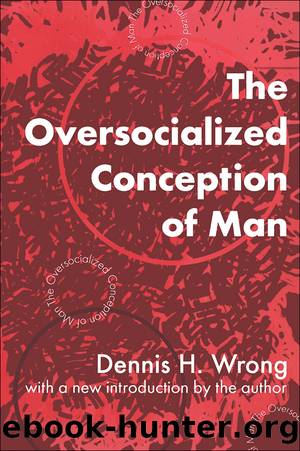The Oversocialized Conception of Man by Dennis H. Wrong

Author:Dennis H. Wrong [Wrong, Dennis H.]
Language: eng
Format: epub
Tags: Social Science, Sociology, General
ISBN: 9781351303385
Google: FyFWDwAAQBAJ
Publisher: Routledge
Published: 2018-04-17T03:37:18+00:00
TEN
Problems in Defining Power
THE MOST GENERAL USE of the word âpowerâ in English is as a synonym for capacity, skill, or talent. This use encompasses the capacity to engage in certain kinds of performance, or âskillâ in the strict sense, the capacity to produce an effect of some sort on the external world, and the physical or psychological energies underlying any and all human performancesâthe âpower to actâ itself, as it were. Sometimes the word is used in the plural to denote the total capacities and energiesâor âfacultiesââof a human being, as in reference to the increasing or failing âpowersâ of a person. When power refers to the energies released by human actions, it merges into the physical concept of energy as the capacity to do work or to move matter, as in steam or electrical power. Applied in this sense to human energies, power is equated with potency, or an actorâs general ability to produce successful performances.
The notion of controlling or acting on resistant materials is implicit in the idea of power as skill or capacity. Some writers have equated power in this general sense with mastery, or with the ability âto produce observed modifications in the external world.â1 In the case of complex physical or mental skills, the recalcitrant materials to be mastered are the actorâs own body and mind rather than objects in the external environment. The actor exercises a power over himself that we usually call âself-disciplineâ or âself-control.â Freudian writers, beginning with Freud himself, habitually employ political metaphors to describe intrapsychic processes: the âtyrannicalâ superego, the âimperiousâ id, the âbargainingâ or âcompromisingâ ego.
Power as potency and, though less unambiguously, as mastery is unmistakably a âdispositionalâ term in Gilbert Ryleâs sense, referring not to an actual performance but to the capacity, latent in the actor even when not being exercised, to produce a particular kind of performance.2 When we are concerned with power as a social relation between actors, it is important, as I shall argue in more detail below, to retain the dispositional sense of the term, although the sociological concept of power must not imply that it is an attribute of an actor rather than a relation between actors, whether individuals or groups.
Two famous British philosophers, separated by nearly three centuries, defined power similarly. Thomas Hobbes defined it as âmanâs present means to any future apparent good,â3 while to Bertrand Russell, power was âthe production of intended effects.â4 Hobbesâs definition is clearly a dispositional one, for a man may obviously possess the means to attain a future good even when he is not engaged in employing them to that end. Russellâs definition, however, lends itself to being understood as âepisodicâ5 rather than dispositional, unless one adds the phrase âthe capacity forâ in front of âthe production of intended effects.â
But both definitions identify power with potency or mastery and are therefore too general if oneâs interest is in power as a social relationship, for both cover power over the self and over nature as well as the power of men over other men.
Download
This site does not store any files on its server. We only index and link to content provided by other sites. Please contact the content providers to delete copyright contents if any and email us, we'll remove relevant links or contents immediately.
Cecilia; Or, Memoirs of an Heiress — Volume 1 by Fanny Burney(32536)
Cecilia; Or, Memoirs of an Heiress — Volume 2 by Fanny Burney(31934)
Cecilia; Or, Memoirs of an Heiress — Volume 3 by Fanny Burney(31925)
The Great Music City by Andrea Baker(31911)
We're Going to Need More Wine by Gabrielle Union(19030)
All the Missing Girls by Megan Miranda(15922)
Pimp by Iceberg Slim(14476)
Bombshells: Glamour Girls of a Lifetime by Sullivan Steve(14046)
For the Love of Europe by Rick Steves(13854)
Talking to Strangers by Malcolm Gladwell(13340)
Norse Mythology by Gaiman Neil(13332)
Fifty Shades Freed by E L James(13227)
Mindhunter: Inside the FBI's Elite Serial Crime Unit by John E. Douglas & Mark Olshaker(9312)
Crazy Rich Asians by Kevin Kwan(9271)
The Lost Art of Listening by Michael P. Nichols(7486)
Enlightenment Now: The Case for Reason, Science, Humanism, and Progress by Steven Pinker(7303)
The Four Agreements by Don Miguel Ruiz(6739)
Bad Blood by John Carreyrou(6608)
Weapons of Math Destruction by Cathy O'Neil(6260)
